Detailed Report on Negotiation Strategies: Marks & Spencer Example
VerifiedAdded on 2020/12/30
|13
|3528
|264
Report
AI Summary
This report provides a comprehensive analysis of negotiation strategies within the context of business administration, using Marks & Spencer as a case study. It explores the essential requirements of a negotiation strategy, including the benefits of a win-win approach and the importance of co-ordination among parties. The report delves into various negotiation techniques, such as information sharing, clarification of misconceptions, and anticipating compromises. It emphasizes the significance of researching the other party's strengths and weaknesses, as well as the impact of cultural differences on negotiations. Furthermore, the report examines the purpose, scope, and objectives of negotiation, the scope of authority, and the preparation of negotiating strategies, including fall-back stances and compromise. It concludes by highlighting the importance of adapting to changing circumstances, maintaining accurate records, and adhering to organizational policies and ethical requirements. The report offers valuable insights for business professionals and students alike, providing a practical understanding of effective negotiation practices.
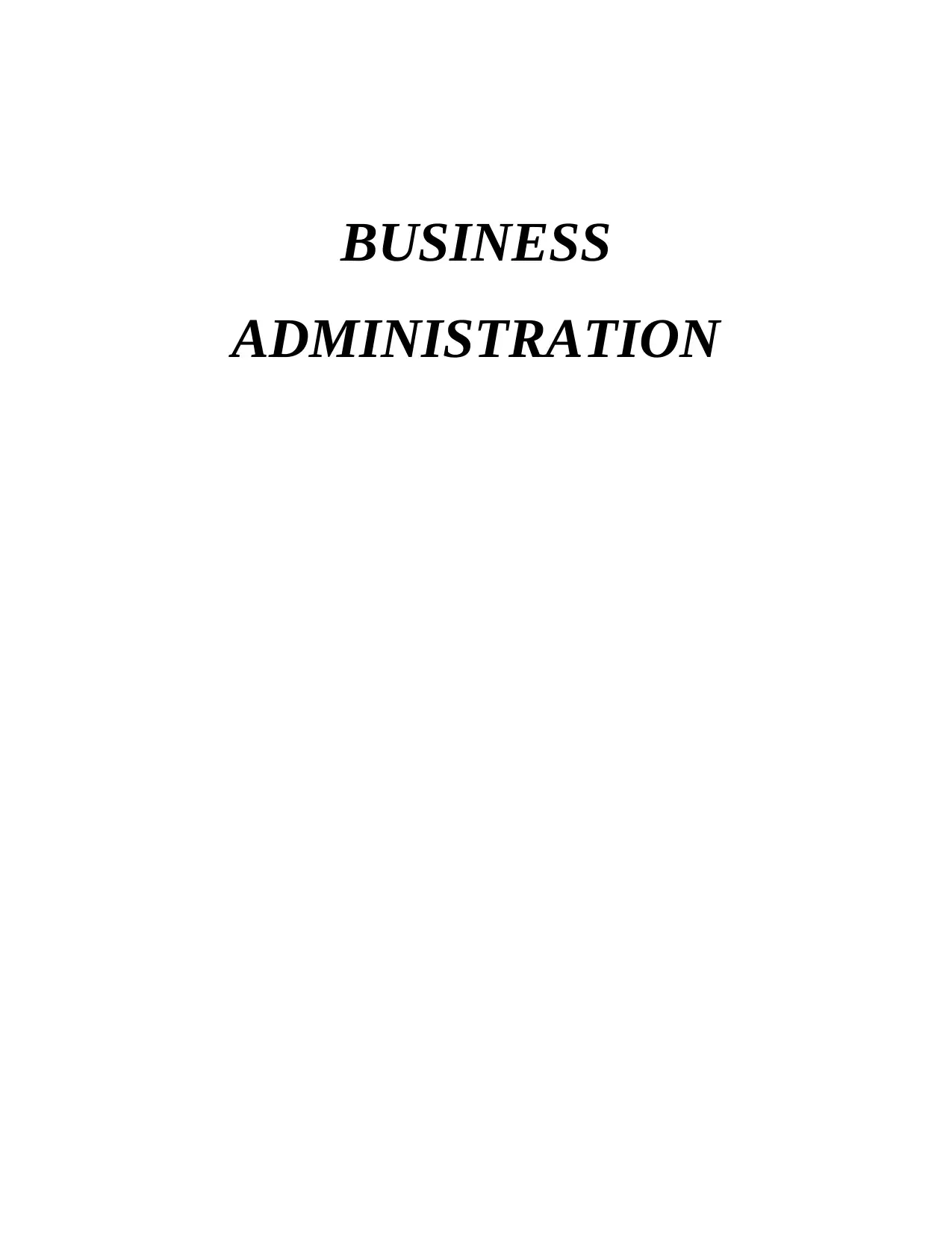
BUSINESS
ADMINISTRATION
ADMINISTRATION
Paraphrase This Document
Need a fresh take? Get an instant paraphrase of this document with our AI Paraphraser
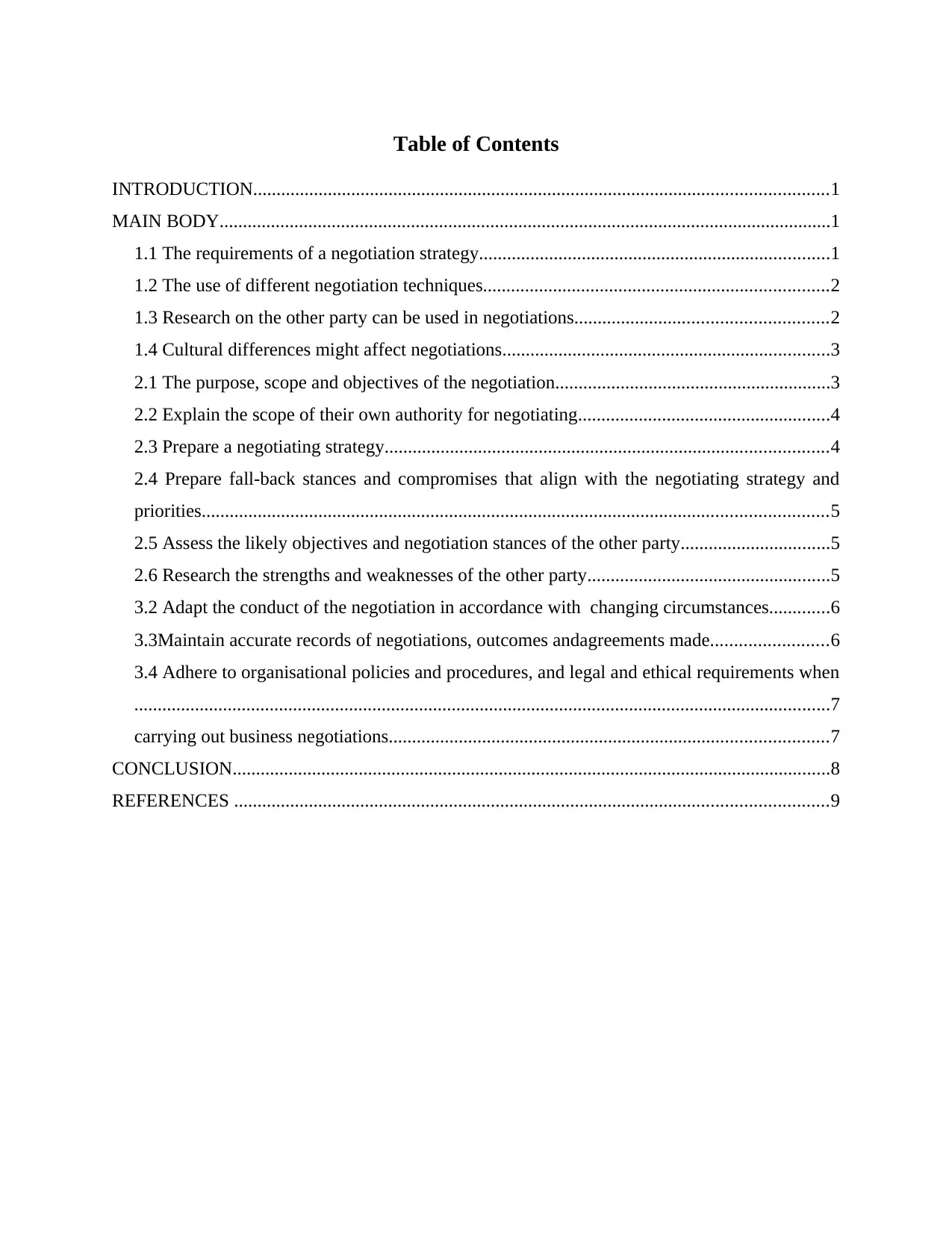
Table of Contents
INTRODUCTION...........................................................................................................................1
MAIN BODY...................................................................................................................................1
1.1 The requirements of a negotiation strategy...........................................................................1
1.2 The use of different negotiation techniques..........................................................................2
1.3 Research on the other party can be used in negotiations......................................................2
1.4 Cultural differences might affect negotiations......................................................................3
2.1 The purpose, scope and objectives of the negotiation...........................................................3
2.2 Explain the scope of their own authority for negotiating......................................................4
2.3 Prepare a negotiating strategy...............................................................................................4
2.4 Prepare fall-back stances and compromises that align with the negotiating strategy and
priorities......................................................................................................................................5
2.5 Assess the likely objectives and negotiation stances of the other party................................5
2.6 Research the strengths and weaknesses of the other party....................................................5
3.2 Adapt the conduct of the negotiation in accordance with changing circumstances.............6
3.3Maintain accurate records of negotiations, outcomes andagreements made.........................6
3.4 Adhere to organisational policies and procedures, and legal and ethical requirements when
.....................................................................................................................................................7
carrying out business negotiations..............................................................................................7
CONCLUSION................................................................................................................................8
REFERENCES ...............................................................................................................................9
INTRODUCTION...........................................................................................................................1
MAIN BODY...................................................................................................................................1
1.1 The requirements of a negotiation strategy...........................................................................1
1.2 The use of different negotiation techniques..........................................................................2
1.3 Research on the other party can be used in negotiations......................................................2
1.4 Cultural differences might affect negotiations......................................................................3
2.1 The purpose, scope and objectives of the negotiation...........................................................3
2.2 Explain the scope of their own authority for negotiating......................................................4
2.3 Prepare a negotiating strategy...............................................................................................4
2.4 Prepare fall-back stances and compromises that align with the negotiating strategy and
priorities......................................................................................................................................5
2.5 Assess the likely objectives and negotiation stances of the other party................................5
2.6 Research the strengths and weaknesses of the other party....................................................5
3.2 Adapt the conduct of the negotiation in accordance with changing circumstances.............6
3.3Maintain accurate records of negotiations, outcomes andagreements made.........................6
3.4 Adhere to organisational policies and procedures, and legal and ethical requirements when
.....................................................................................................................................................7
carrying out business negotiations..............................................................................................7
CONCLUSION................................................................................................................................8
REFERENCES ...............................................................................................................................9
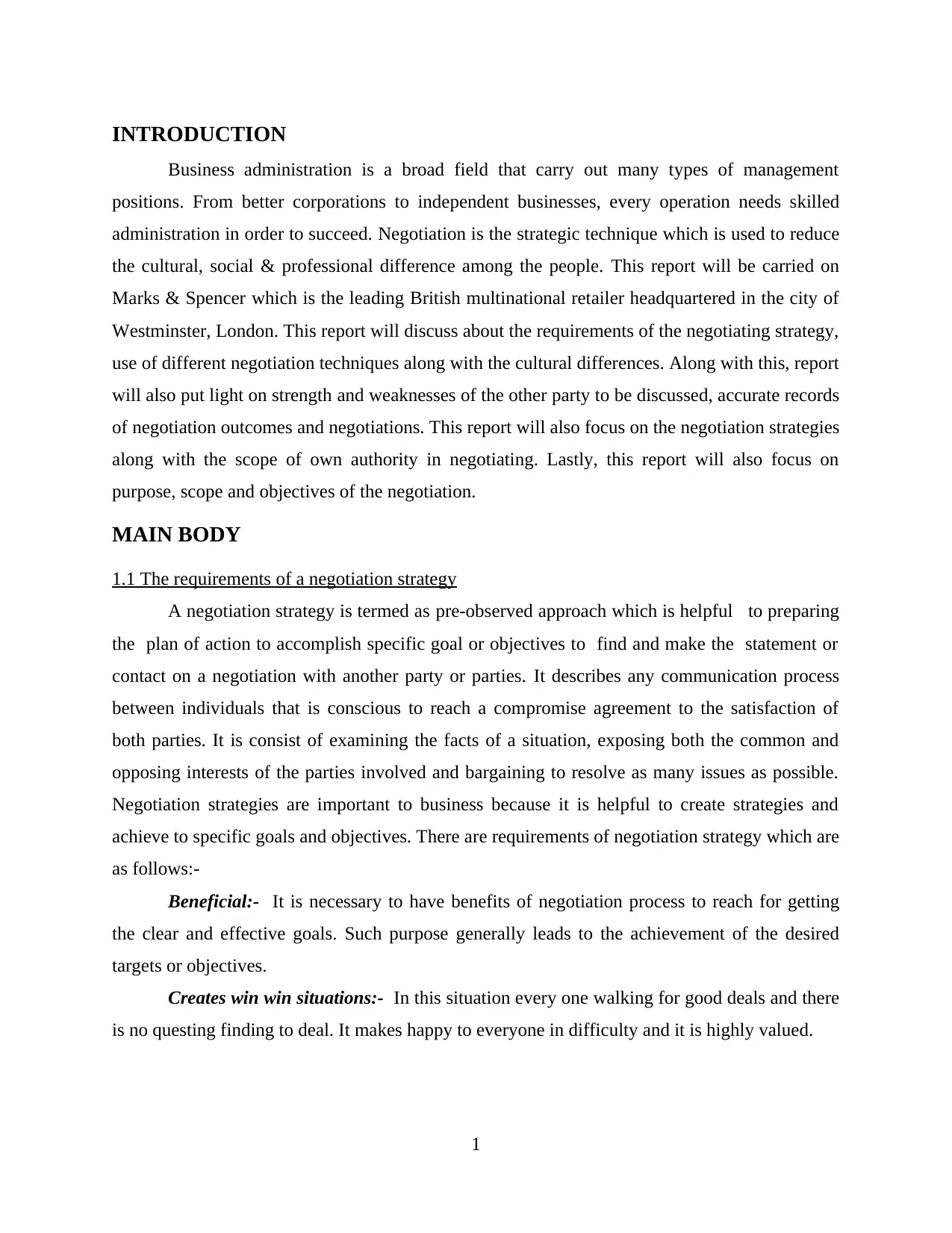
INTRODUCTION
Business administration is a broad field that carry out many types of management
positions. From better corporations to independent businesses, every operation needs skilled
administration in order to succeed. Negotiation is the strategic technique which is used to reduce
the cultural, social & professional difference among the people. This report will be carried on
Marks & Spencer which is the leading British multinational retailer headquartered in the city of
Westminster, London. This report will discuss about the requirements of the negotiating strategy,
use of different negotiation techniques along with the cultural differences. Along with this, report
will also put light on strength and weaknesses of the other party to be discussed, accurate records
of negotiation outcomes and negotiations. This report will also focus on the negotiation strategies
along with the scope of own authority in negotiating. Lastly, this report will also focus on
purpose, scope and objectives of the negotiation.
MAIN BODY
1.1 The requirements of a negotiation strategy
A negotiation strategy is termed as pre-observed approach which is helpful to preparing
the plan of action to accomplish specific goal or objectives to find and make the statement or
contact on a negotiation with another party or parties. It describes any communication process
between individuals that is conscious to reach a compromise agreement to the satisfaction of
both parties. It is consist of examining the facts of a situation, exposing both the common and
opposing interests of the parties involved and bargaining to resolve as many issues as possible.
Negotiation strategies are important to business because it is helpful to create strategies and
achieve to specific goals and objectives. There are requirements of negotiation strategy which are
as follows:-
Beneficial:- It is necessary to have benefits of negotiation process to reach for getting
the clear and effective goals. Such purpose generally leads to the achievement of the desired
targets or objectives.
Creates win win situations:- In this situation every one walking for good deals and there
is no questing finding to deal. It makes happy to everyone in difficulty and it is highly valued.
1
Business administration is a broad field that carry out many types of management
positions. From better corporations to independent businesses, every operation needs skilled
administration in order to succeed. Negotiation is the strategic technique which is used to reduce
the cultural, social & professional difference among the people. This report will be carried on
Marks & Spencer which is the leading British multinational retailer headquartered in the city of
Westminster, London. This report will discuss about the requirements of the negotiating strategy,
use of different negotiation techniques along with the cultural differences. Along with this, report
will also put light on strength and weaknesses of the other party to be discussed, accurate records
of negotiation outcomes and negotiations. This report will also focus on the negotiation strategies
along with the scope of own authority in negotiating. Lastly, this report will also focus on
purpose, scope and objectives of the negotiation.
MAIN BODY
1.1 The requirements of a negotiation strategy
A negotiation strategy is termed as pre-observed approach which is helpful to preparing
the plan of action to accomplish specific goal or objectives to find and make the statement or
contact on a negotiation with another party or parties. It describes any communication process
between individuals that is conscious to reach a compromise agreement to the satisfaction of
both parties. It is consist of examining the facts of a situation, exposing both the common and
opposing interests of the parties involved and bargaining to resolve as many issues as possible.
Negotiation strategies are important to business because it is helpful to create strategies and
achieve to specific goals and objectives. There are requirements of negotiation strategy which are
as follows:-
Beneficial:- It is necessary to have benefits of negotiation process to reach for getting
the clear and effective goals. Such purpose generally leads to the achievement of the desired
targets or objectives.
Creates win win situations:- In this situation every one walking for good deals and there
is no questing finding to deal. It makes happy to everyone in difficulty and it is highly valued.
1
⊘ This is a preview!⊘
Do you want full access?
Subscribe today to unlock all pages.

Trusted by 1+ million students worldwide
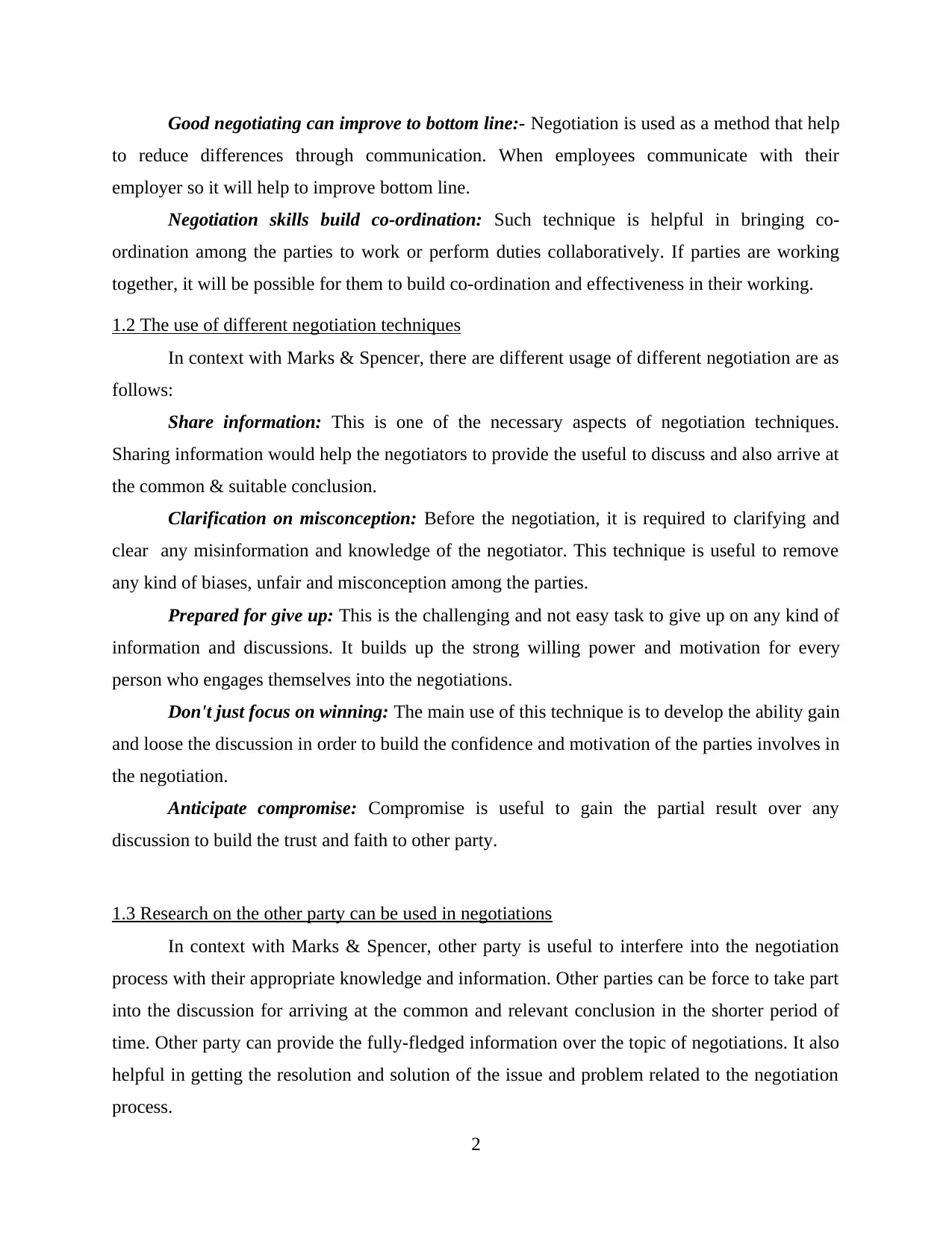
Good negotiating can improve to bottom line:- Negotiation is used as a method that help
to reduce differences through communication. When employees communicate with their
employer so it will help to improve bottom line.
Negotiation skills build co-ordination: Such technique is helpful in bringing co-
ordination among the parties to work or perform duties collaboratively. If parties are working
together, it will be possible for them to build co-ordination and effectiveness in their working.
1.2 The use of different negotiation techniques
In context with Marks & Spencer, there are different usage of different negotiation are as
follows:
Share information: This is one of the necessary aspects of negotiation techniques.
Sharing information would help the negotiators to provide the useful to discuss and also arrive at
the common & suitable conclusion.
Clarification on misconception: Before the negotiation, it is required to clarifying and
clear any misinformation and knowledge of the negotiator. This technique is useful to remove
any kind of biases, unfair and misconception among the parties.
Prepared for give up: This is the challenging and not easy task to give up on any kind of
information and discussions. It builds up the strong willing power and motivation for every
person who engages themselves into the negotiations.
Don't just focus on winning: The main use of this technique is to develop the ability gain
and loose the discussion in order to build the confidence and motivation of the parties involves in
the negotiation.
Anticipate compromise: Compromise is useful to gain the partial result over any
discussion to build the trust and faith to other party.
1.3 Research on the other party can be used in negotiations
In context with Marks & Spencer, other party is useful to interfere into the negotiation
process with their appropriate knowledge and information. Other parties can be force to take part
into the discussion for arriving at the common and relevant conclusion in the shorter period of
time. Other party can provide the fully-fledged information over the topic of negotiations. It also
helpful in getting the resolution and solution of the issue and problem related to the negotiation
process.
2
to reduce differences through communication. When employees communicate with their
employer so it will help to improve bottom line.
Negotiation skills build co-ordination: Such technique is helpful in bringing co-
ordination among the parties to work or perform duties collaboratively. If parties are working
together, it will be possible for them to build co-ordination and effectiveness in their working.
1.2 The use of different negotiation techniques
In context with Marks & Spencer, there are different usage of different negotiation are as
follows:
Share information: This is one of the necessary aspects of negotiation techniques.
Sharing information would help the negotiators to provide the useful to discuss and also arrive at
the common & suitable conclusion.
Clarification on misconception: Before the negotiation, it is required to clarifying and
clear any misinformation and knowledge of the negotiator. This technique is useful to remove
any kind of biases, unfair and misconception among the parties.
Prepared for give up: This is the challenging and not easy task to give up on any kind of
information and discussions. It builds up the strong willing power and motivation for every
person who engages themselves into the negotiations.
Don't just focus on winning: The main use of this technique is to develop the ability gain
and loose the discussion in order to build the confidence and motivation of the parties involves in
the negotiation.
Anticipate compromise: Compromise is useful to gain the partial result over any
discussion to build the trust and faith to other party.
1.3 Research on the other party can be used in negotiations
In context with Marks & Spencer, other party is useful to interfere into the negotiation
process with their appropriate knowledge and information. Other parties can be force to take part
into the discussion for arriving at the common and relevant conclusion in the shorter period of
time. Other party can provide the fully-fledged information over the topic of negotiations. It also
helpful in getting the resolution and solution of the issue and problem related to the negotiation
process.
2
Paraphrase This Document
Need a fresh take? Get an instant paraphrase of this document with our AI Paraphraser
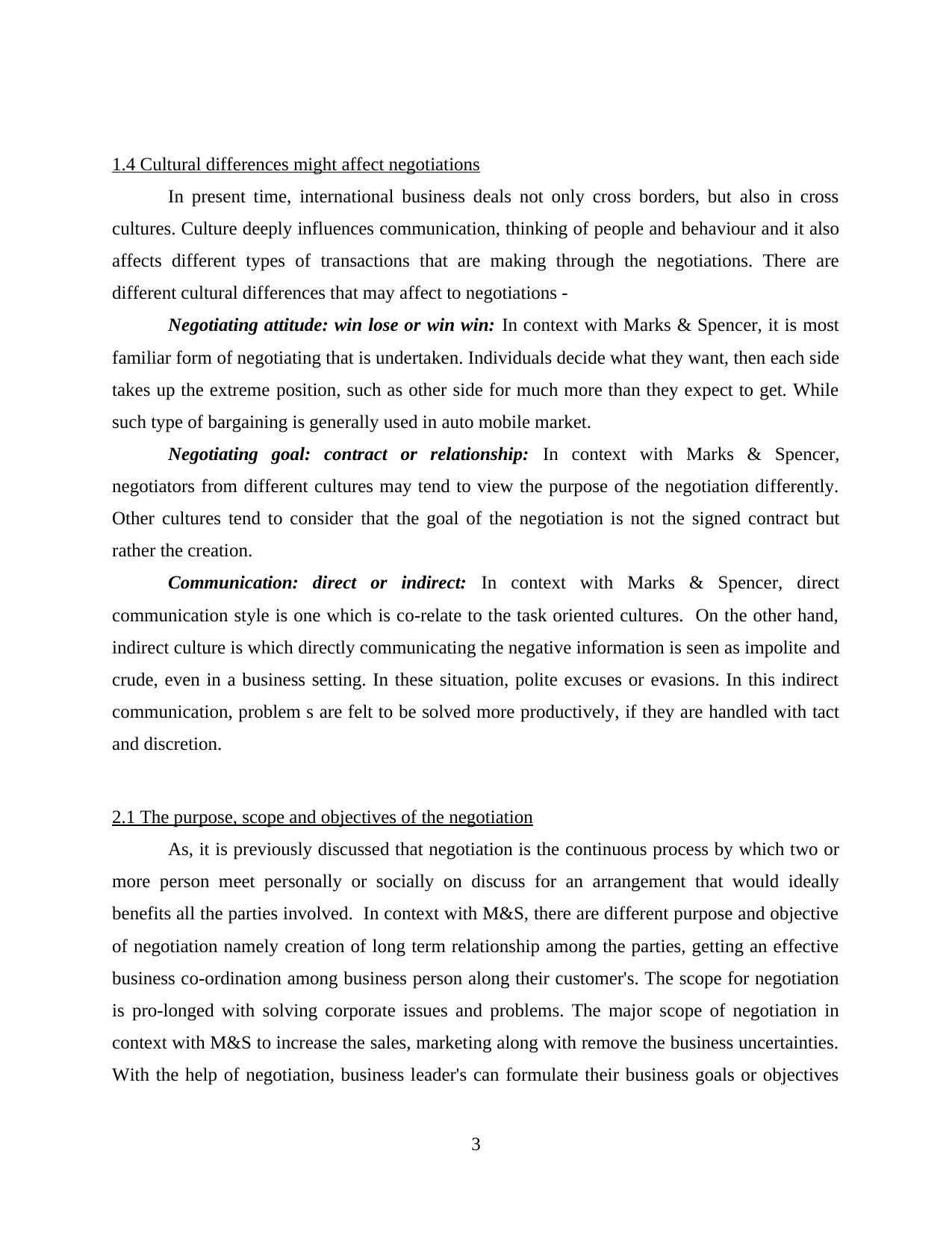
1.4 Cultural differences might affect negotiations
In present time, international business deals not only cross borders, but also in cross
cultures. Culture deeply influences communication, thinking of people and behaviour and it also
affects different types of transactions that are making through the negotiations. There are
different cultural differences that may affect to negotiations -
Negotiating attitude: win lose or win win: In context with Marks & Spencer, it is most
familiar form of negotiating that is undertaken. Individuals decide what they want, then each side
takes up the extreme position, such as other side for much more than they expect to get. While
such type of bargaining is generally used in auto mobile market.
Negotiating goal: contract or relationship: In context with Marks & Spencer,
negotiators from different cultures may tend to view the purpose of the negotiation differently.
Other cultures tend to consider that the goal of the negotiation is not the signed contract but
rather the creation.
Communication: direct or indirect: In context with Marks & Spencer, direct
communication style is one which is co-relate to the task oriented cultures. On the other hand,
indirect culture is which directly communicating the negative information is seen as impolite and
crude, even in a business setting. In these situation, polite excuses or evasions. In this indirect
communication, problem s are felt to be solved more productively, if they are handled with tact
and discretion.
2.1 The purpose, scope and objectives of the negotiation
As, it is previously discussed that negotiation is the continuous process by which two or
more person meet personally or socially on discuss for an arrangement that would ideally
benefits all the parties involved. In context with M&S, there are different purpose and objective
of negotiation namely creation of long term relationship among the parties, getting an effective
business co-ordination among business person along their customer's. The scope for negotiation
is pro-longed with solving corporate issues and problems. The major scope of negotiation in
context with M&S to increase the sales, marketing along with remove the business uncertainties.
With the help of negotiation, business leader's can formulate their business goals or objectives
3
In present time, international business deals not only cross borders, but also in cross
cultures. Culture deeply influences communication, thinking of people and behaviour and it also
affects different types of transactions that are making through the negotiations. There are
different cultural differences that may affect to negotiations -
Negotiating attitude: win lose or win win: In context with Marks & Spencer, it is most
familiar form of negotiating that is undertaken. Individuals decide what they want, then each side
takes up the extreme position, such as other side for much more than they expect to get. While
such type of bargaining is generally used in auto mobile market.
Negotiating goal: contract or relationship: In context with Marks & Spencer,
negotiators from different cultures may tend to view the purpose of the negotiation differently.
Other cultures tend to consider that the goal of the negotiation is not the signed contract but
rather the creation.
Communication: direct or indirect: In context with Marks & Spencer, direct
communication style is one which is co-relate to the task oriented cultures. On the other hand,
indirect culture is which directly communicating the negative information is seen as impolite and
crude, even in a business setting. In these situation, polite excuses or evasions. In this indirect
communication, problem s are felt to be solved more productively, if they are handled with tact
and discretion.
2.1 The purpose, scope and objectives of the negotiation
As, it is previously discussed that negotiation is the continuous process by which two or
more person meet personally or socially on discuss for an arrangement that would ideally
benefits all the parties involved. In context with M&S, there are different purpose and objective
of negotiation namely creation of long term relationship among the parties, getting an effective
business co-ordination among business person along their customer's. The scope for negotiation
is pro-longed with solving corporate issues and problems. The major scope of negotiation in
context with M&S to increase the sales, marketing along with remove the business uncertainties.
With the help of negotiation, business leader's can formulate their business goals or objectives
3
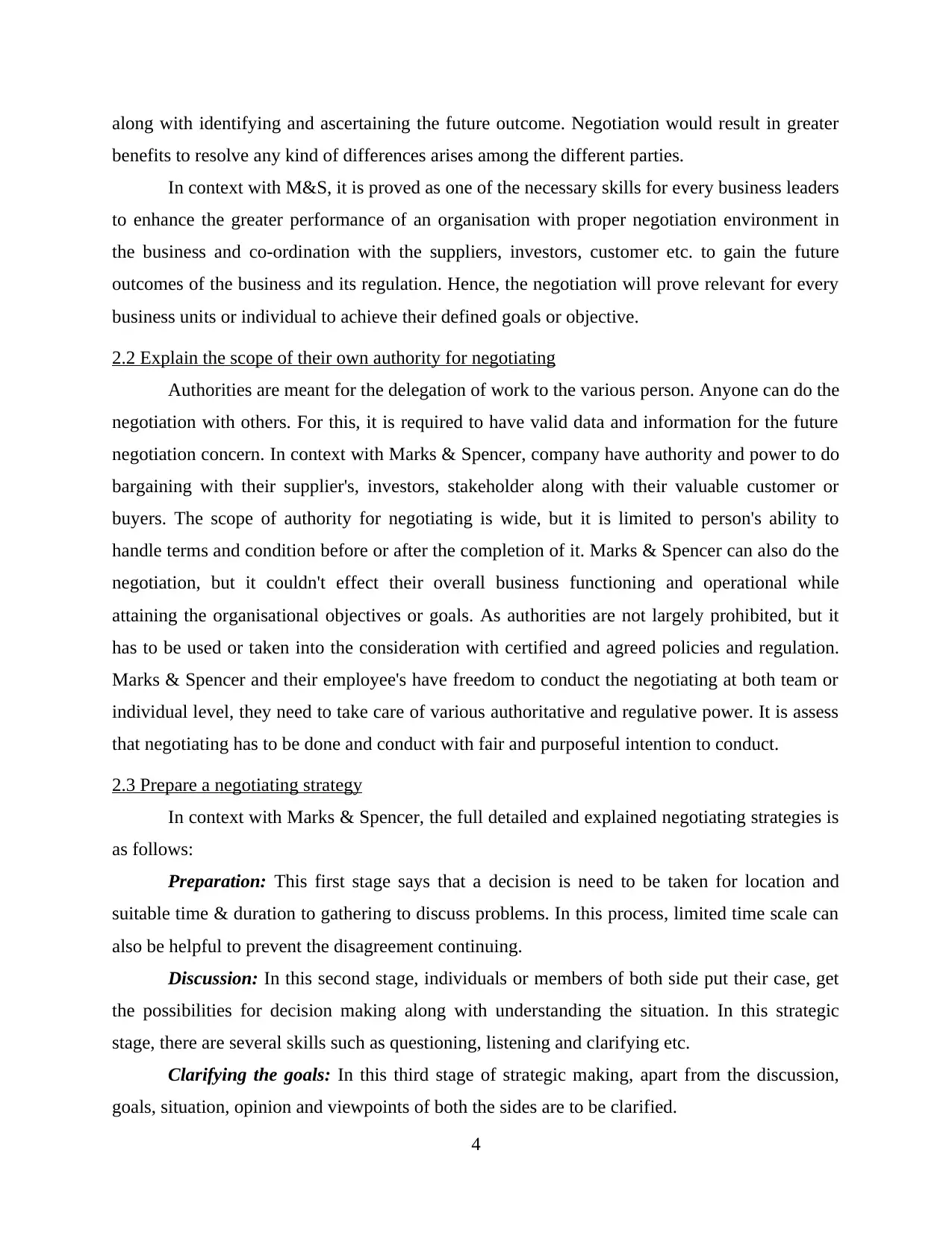
along with identifying and ascertaining the future outcome. Negotiation would result in greater
benefits to resolve any kind of differences arises among the different parties.
In context with M&S, it is proved as one of the necessary skills for every business leaders
to enhance the greater performance of an organisation with proper negotiation environment in
the business and co-ordination with the suppliers, investors, customer etc. to gain the future
outcomes of the business and its regulation. Hence, the negotiation will prove relevant for every
business units or individual to achieve their defined goals or objective.
2.2 Explain the scope of their own authority for negotiating
Authorities are meant for the delegation of work to the various person. Anyone can do the
negotiation with others. For this, it is required to have valid data and information for the future
negotiation concern. In context with Marks & Spencer, company have authority and power to do
bargaining with their supplier's, investors, stakeholder along with their valuable customer or
buyers. The scope of authority for negotiating is wide, but it is limited to person's ability to
handle terms and condition before or after the completion of it. Marks & Spencer can also do the
negotiation, but it couldn't effect their overall business functioning and operational while
attaining the organisational objectives or goals. As authorities are not largely prohibited, but it
has to be used or taken into the consideration with certified and agreed policies and regulation.
Marks & Spencer and their employee's have freedom to conduct the negotiating at both team or
individual level, they need to take care of various authoritative and regulative power. It is assess
that negotiating has to be done and conduct with fair and purposeful intention to conduct.
2.3 Prepare a negotiating strategy
In context with Marks & Spencer, the full detailed and explained negotiating strategies is
as follows:
Preparation: This first stage says that a decision is need to be taken for location and
suitable time & duration to gathering to discuss problems. In this process, limited time scale can
also be helpful to prevent the disagreement continuing.
Discussion: In this second stage, individuals or members of both side put their case, get
the possibilities for decision making along with understanding the situation. In this strategic
stage, there are several skills such as questioning, listening and clarifying etc.
Clarifying the goals: In this third stage of strategic making, apart from the discussion,
goals, situation, opinion and viewpoints of both the sides are to be clarified.
4
benefits to resolve any kind of differences arises among the different parties.
In context with M&S, it is proved as one of the necessary skills for every business leaders
to enhance the greater performance of an organisation with proper negotiation environment in
the business and co-ordination with the suppliers, investors, customer etc. to gain the future
outcomes of the business and its regulation. Hence, the negotiation will prove relevant for every
business units or individual to achieve their defined goals or objective.
2.2 Explain the scope of their own authority for negotiating
Authorities are meant for the delegation of work to the various person. Anyone can do the
negotiation with others. For this, it is required to have valid data and information for the future
negotiation concern. In context with Marks & Spencer, company have authority and power to do
bargaining with their supplier's, investors, stakeholder along with their valuable customer or
buyers. The scope of authority for negotiating is wide, but it is limited to person's ability to
handle terms and condition before or after the completion of it. Marks & Spencer can also do the
negotiation, but it couldn't effect their overall business functioning and operational while
attaining the organisational objectives or goals. As authorities are not largely prohibited, but it
has to be used or taken into the consideration with certified and agreed policies and regulation.
Marks & Spencer and their employee's have freedom to conduct the negotiating at both team or
individual level, they need to take care of various authoritative and regulative power. It is assess
that negotiating has to be done and conduct with fair and purposeful intention to conduct.
2.3 Prepare a negotiating strategy
In context with Marks & Spencer, the full detailed and explained negotiating strategies is
as follows:
Preparation: This first stage says that a decision is need to be taken for location and
suitable time & duration to gathering to discuss problems. In this process, limited time scale can
also be helpful to prevent the disagreement continuing.
Discussion: In this second stage, individuals or members of both side put their case, get
the possibilities for decision making along with understanding the situation. In this strategic
stage, there are several skills such as questioning, listening and clarifying etc.
Clarifying the goals: In this third stage of strategic making, apart from the discussion,
goals, situation, opinion and viewpoints of both the sides are to be clarified.
4
⊘ This is a preview!⊘
Do you want full access?
Subscribe today to unlock all pages.

Trusted by 1+ million students worldwide
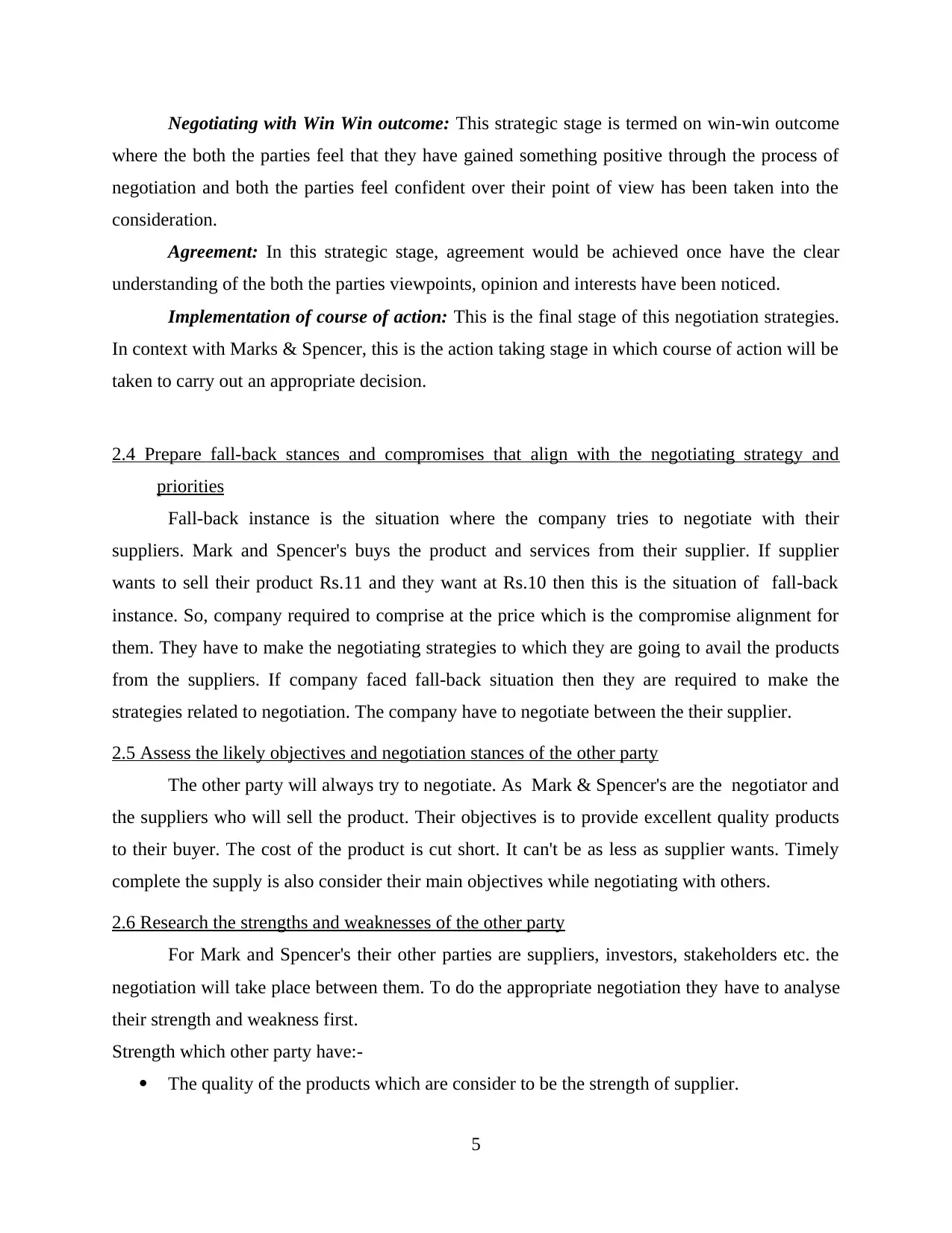
Negotiating with Win Win outcome: This strategic stage is termed on win-win outcome
where the both the parties feel that they have gained something positive through the process of
negotiation and both the parties feel confident over their point of view has been taken into the
consideration.
Agreement: In this strategic stage, agreement would be achieved once have the clear
understanding of the both the parties viewpoints, opinion and interests have been noticed.
Implementation of course of action: This is the final stage of this negotiation strategies.
In context with Marks & Spencer, this is the action taking stage in which course of action will be
taken to carry out an appropriate decision.
2.4 Prepare fall-back stances and compromises that align with the negotiating strategy and
priorities
Fall-back instance is the situation where the company tries to negotiate with their
suppliers. Mark and Spencer's buys the product and services from their supplier. If supplier
wants to sell their product Rs.11 and they want at Rs.10 then this is the situation of fall-back
instance. So, company required to comprise at the price which is the compromise alignment for
them. They have to make the negotiating strategies to which they are going to avail the products
from the suppliers. If company faced fall-back situation then they are required to make the
strategies related to negotiation. The company have to negotiate between the their supplier.
2.5 Assess the likely objectives and negotiation stances of the other party
The other party will always try to negotiate. As Mark & Spencer's are the negotiator and
the suppliers who will sell the product. Their objectives is to provide excellent quality products
to their buyer. The cost of the product is cut short. It can't be as less as supplier wants. Timely
complete the supply is also consider their main objectives while negotiating with others.
2.6 Research the strengths and weaknesses of the other party
For Mark and Spencer's their other parties are suppliers, investors, stakeholders etc. the
negotiation will take place between them. To do the appropriate negotiation they have to analyse
their strength and weakness first.
Strength which other party have:-
The quality of the products which are consider to be the strength of supplier.
5
where the both the parties feel that they have gained something positive through the process of
negotiation and both the parties feel confident over their point of view has been taken into the
consideration.
Agreement: In this strategic stage, agreement would be achieved once have the clear
understanding of the both the parties viewpoints, opinion and interests have been noticed.
Implementation of course of action: This is the final stage of this negotiation strategies.
In context with Marks & Spencer, this is the action taking stage in which course of action will be
taken to carry out an appropriate decision.
2.4 Prepare fall-back stances and compromises that align with the negotiating strategy and
priorities
Fall-back instance is the situation where the company tries to negotiate with their
suppliers. Mark and Spencer's buys the product and services from their supplier. If supplier
wants to sell their product Rs.11 and they want at Rs.10 then this is the situation of fall-back
instance. So, company required to comprise at the price which is the compromise alignment for
them. They have to make the negotiating strategies to which they are going to avail the products
from the suppliers. If company faced fall-back situation then they are required to make the
strategies related to negotiation. The company have to negotiate between the their supplier.
2.5 Assess the likely objectives and negotiation stances of the other party
The other party will always try to negotiate. As Mark & Spencer's are the negotiator and
the suppliers who will sell the product. Their objectives is to provide excellent quality products
to their buyer. The cost of the product is cut short. It can't be as less as supplier wants. Timely
complete the supply is also consider their main objectives while negotiating with others.
2.6 Research the strengths and weaknesses of the other party
For Mark and Spencer's their other parties are suppliers, investors, stakeholders etc. the
negotiation will take place between them. To do the appropriate negotiation they have to analyse
their strength and weakness first.
Strength which other party have:-
The quality of the products which are consider to be the strength of supplier.
5
Paraphrase This Document
Need a fresh take? Get an instant paraphrase of this document with our AI Paraphraser
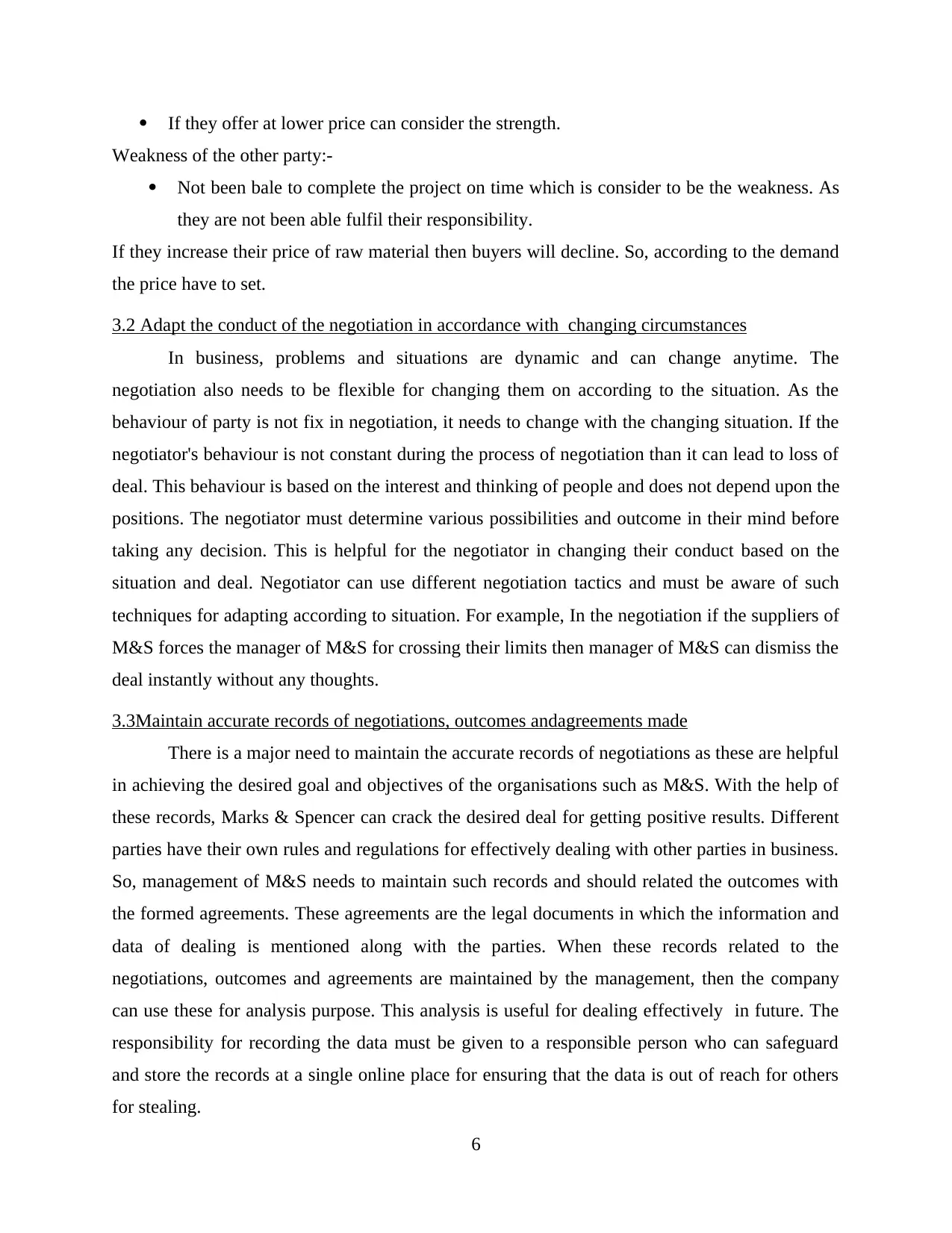
If they offer at lower price can consider the strength.
Weakness of the other party:-
Not been bale to complete the project on time which is consider to be the weakness. As
they are not been able fulfil their responsibility.
If they increase their price of raw material then buyers will decline. So, according to the demand
the price have to set.
3.2 Adapt the conduct of the negotiation in accordance with changing circumstances
In business, problems and situations are dynamic and can change anytime. The
negotiation also needs to be flexible for changing them on according to the situation. As the
behaviour of party is not fix in negotiation, it needs to change with the changing situation. If the
negotiator's behaviour is not constant during the process of negotiation than it can lead to loss of
deal. This behaviour is based on the interest and thinking of people and does not depend upon the
positions. The negotiator must determine various possibilities and outcome in their mind before
taking any decision. This is helpful for the negotiator in changing their conduct based on the
situation and deal. Negotiator can use different negotiation tactics and must be aware of such
techniques for adapting according to situation. For example, In the negotiation if the suppliers of
M&S forces the manager of M&S for crossing their limits then manager of M&S can dismiss the
deal instantly without any thoughts.
3.3Maintain accurate records of negotiations, outcomes andagreements made
There is a major need to maintain the accurate records of negotiations as these are helpful
in achieving the desired goal and objectives of the organisations such as M&S. With the help of
these records, Marks & Spencer can crack the desired deal for getting positive results. Different
parties have their own rules and regulations for effectively dealing with other parties in business.
So, management of M&S needs to maintain such records and should related the outcomes with
the formed agreements. These agreements are the legal documents in which the information and
data of dealing is mentioned along with the parties. When these records related to the
negotiations, outcomes and agreements are maintained by the management, then the company
can use these for analysis purpose. This analysis is useful for dealing effectively in future. The
responsibility for recording the data must be given to a responsible person who can safeguard
and store the records at a single online place for ensuring that the data is out of reach for others
for stealing.
6
Weakness of the other party:-
Not been bale to complete the project on time which is consider to be the weakness. As
they are not been able fulfil their responsibility.
If they increase their price of raw material then buyers will decline. So, according to the demand
the price have to set.
3.2 Adapt the conduct of the negotiation in accordance with changing circumstances
In business, problems and situations are dynamic and can change anytime. The
negotiation also needs to be flexible for changing them on according to the situation. As the
behaviour of party is not fix in negotiation, it needs to change with the changing situation. If the
negotiator's behaviour is not constant during the process of negotiation than it can lead to loss of
deal. This behaviour is based on the interest and thinking of people and does not depend upon the
positions. The negotiator must determine various possibilities and outcome in their mind before
taking any decision. This is helpful for the negotiator in changing their conduct based on the
situation and deal. Negotiator can use different negotiation tactics and must be aware of such
techniques for adapting according to situation. For example, In the negotiation if the suppliers of
M&S forces the manager of M&S for crossing their limits then manager of M&S can dismiss the
deal instantly without any thoughts.
3.3Maintain accurate records of negotiations, outcomes andagreements made
There is a major need to maintain the accurate records of negotiations as these are helpful
in achieving the desired goal and objectives of the organisations such as M&S. With the help of
these records, Marks & Spencer can crack the desired deal for getting positive results. Different
parties have their own rules and regulations for effectively dealing with other parties in business.
So, management of M&S needs to maintain such records and should related the outcomes with
the formed agreements. These agreements are the legal documents in which the information and
data of dealing is mentioned along with the parties. When these records related to the
negotiations, outcomes and agreements are maintained by the management, then the company
can use these for analysis purpose. This analysis is useful for dealing effectively in future. The
responsibility for recording the data must be given to a responsible person who can safeguard
and store the records at a single online place for ensuring that the data is out of reach for others
for stealing.
6
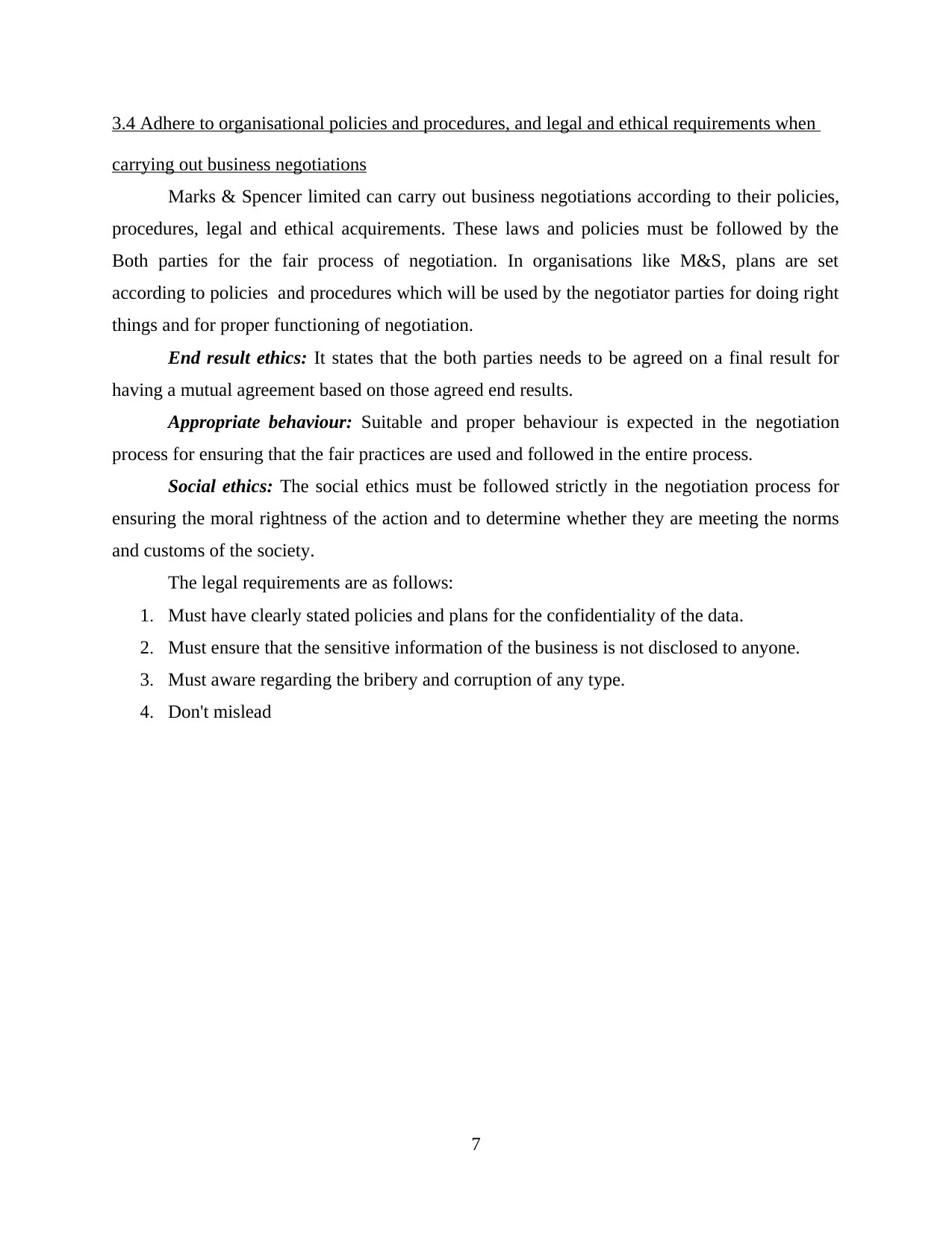
3.4 Adhere to organisational policies and procedures, and legal and ethical requirements when
carrying out business negotiations
Marks & Spencer limited can carry out business negotiations according to their policies,
procedures, legal and ethical acquirements. These laws and policies must be followed by the
Both parties for the fair process of negotiation. In organisations like M&S, plans are set
according to policies and procedures which will be used by the negotiator parties for doing right
things and for proper functioning of negotiation.
End result ethics: It states that the both parties needs to be agreed on a final result for
having a mutual agreement based on those agreed end results.
Appropriate behaviour: Suitable and proper behaviour is expected in the negotiation
process for ensuring that the fair practices are used and followed in the entire process.
Social ethics: The social ethics must be followed strictly in the negotiation process for
ensuring the moral rightness of the action and to determine whether they are meeting the norms
and customs of the society.
The legal requirements are as follows:
1. Must have clearly stated policies and plans for the confidentiality of the data.
2. Must ensure that the sensitive information of the business is not disclosed to anyone.
3. Must aware regarding the bribery and corruption of any type.
4. Don't mislead
7
carrying out business negotiations
Marks & Spencer limited can carry out business negotiations according to their policies,
procedures, legal and ethical acquirements. These laws and policies must be followed by the
Both parties for the fair process of negotiation. In organisations like M&S, plans are set
according to policies and procedures which will be used by the negotiator parties for doing right
things and for proper functioning of negotiation.
End result ethics: It states that the both parties needs to be agreed on a final result for
having a mutual agreement based on those agreed end results.
Appropriate behaviour: Suitable and proper behaviour is expected in the negotiation
process for ensuring that the fair practices are used and followed in the entire process.
Social ethics: The social ethics must be followed strictly in the negotiation process for
ensuring the moral rightness of the action and to determine whether they are meeting the norms
and customs of the society.
The legal requirements are as follows:
1. Must have clearly stated policies and plans for the confidentiality of the data.
2. Must ensure that the sensitive information of the business is not disclosed to anyone.
3. Must aware regarding the bribery and corruption of any type.
4. Don't mislead
7
⊘ This is a preview!⊘
Do you want full access?
Subscribe today to unlock all pages.

Trusted by 1+ million students worldwide
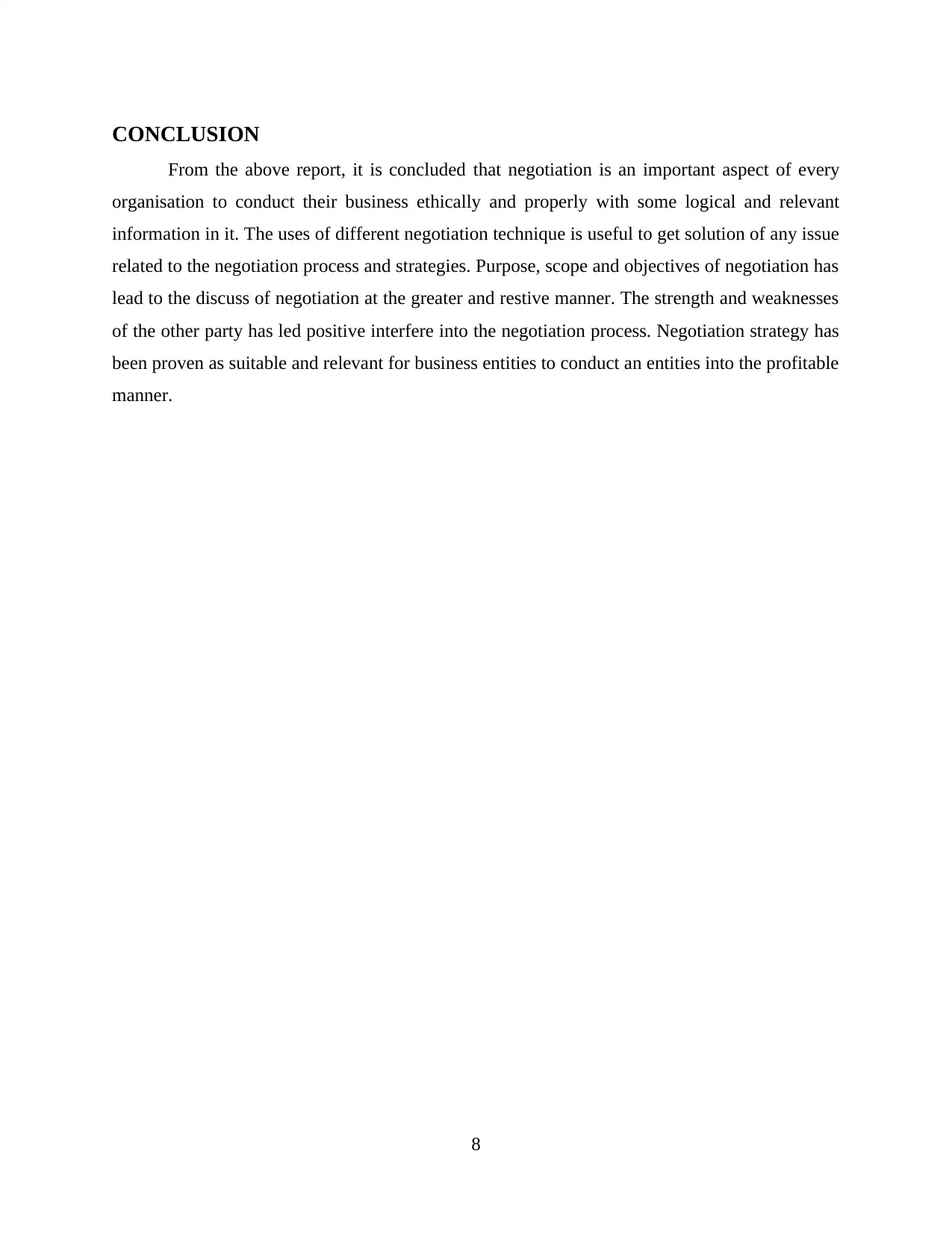
CONCLUSION
From the above report, it is concluded that negotiation is an important aspect of every
organisation to conduct their business ethically and properly with some logical and relevant
information in it. The uses of different negotiation technique is useful to get solution of any issue
related to the negotiation process and strategies. Purpose, scope and objectives of negotiation has
lead to the discuss of negotiation at the greater and restive manner. The strength and weaknesses
of the other party has led positive interfere into the negotiation process. Negotiation strategy has
been proven as suitable and relevant for business entities to conduct an entities into the profitable
manner.
8
From the above report, it is concluded that negotiation is an important aspect of every
organisation to conduct their business ethically and properly with some logical and relevant
information in it. The uses of different negotiation technique is useful to get solution of any issue
related to the negotiation process and strategies. Purpose, scope and objectives of negotiation has
lead to the discuss of negotiation at the greater and restive manner. The strength and weaknesses
of the other party has led positive interfere into the negotiation process. Negotiation strategy has
been proven as suitable and relevant for business entities to conduct an entities into the profitable
manner.
8
Paraphrase This Document
Need a fresh take? Get an instant paraphrase of this document with our AI Paraphraser
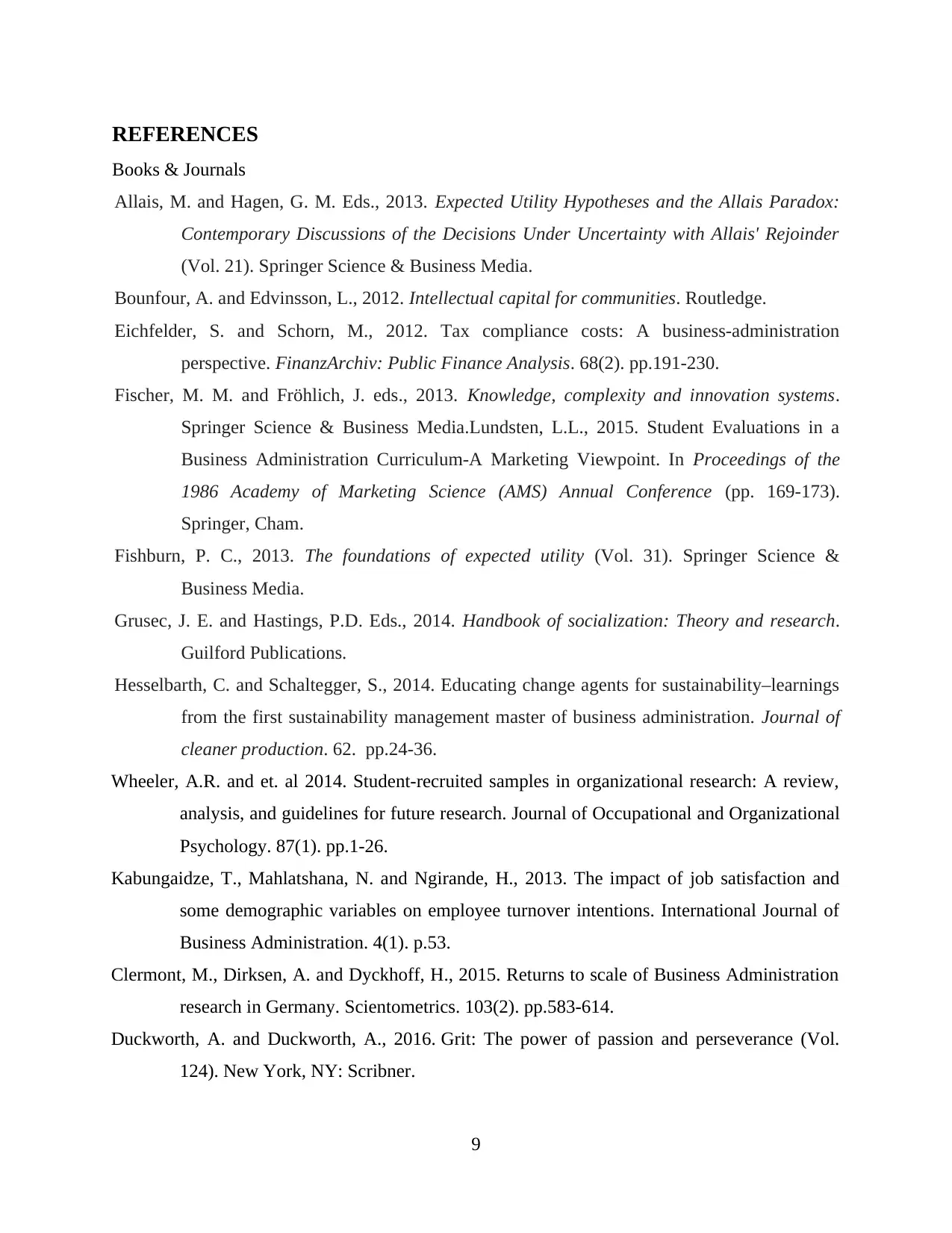
REFERENCES
Books & Journals
Allais, M. and Hagen, G. M. Eds., 2013. Expected Utility Hypotheses and the Allais Paradox:
Contemporary Discussions of the Decisions Under Uncertainty with Allais' Rejoinder
(Vol. 21). Springer Science & Business Media.
Bounfour, A. and Edvinsson, L., 2012. Intellectual capital for communities. Routledge.
Eichfelder, S. and Schorn, M., 2012. Tax compliance costs: A business-administration
perspective. FinanzArchiv: Public Finance Analysis. 68(2). pp.191-230.
Fischer, M. M. and Fröhlich, J. eds., 2013. Knowledge, complexity and innovation systems.
Springer Science & Business Media.Lundsten, L.L., 2015. Student Evaluations in a
Business Administration Curriculum-A Marketing Viewpoint. In Proceedings of the
1986 Academy of Marketing Science (AMS) Annual Conference (pp. 169-173).
Springer, Cham.
Fishburn, P. C., 2013. The foundations of expected utility (Vol. 31). Springer Science &
Business Media.
Grusec, J. E. and Hastings, P.D. Eds., 2014. Handbook of socialization: Theory and research.
Guilford Publications.
Hesselbarth, C. and Schaltegger, S., 2014. Educating change agents for sustainability–learnings
from the first sustainability management master of business administration. Journal of
cleaner production. 62. pp.24-36.
Wheeler, A.R. and et. al 2014. Student‐recruited samples in organizational research: A review,
analysis, and guidelines for future research. Journal of Occupational and Organizational
Psychology. 87(1). pp.1-26.
Kabungaidze, T., Mahlatshana, N. and Ngirande, H., 2013. The impact of job satisfaction and
some demographic variables on employee turnover intentions. International Journal of
Business Administration. 4(1). p.53.
Clermont, M., Dirksen, A. and Dyckhoff, H., 2015. Returns to scale of Business Administration
research in Germany. Scientometrics. 103(2). pp.583-614.
Duckworth, A. and Duckworth, A., 2016. Grit: The power of passion and perseverance (Vol.
124). New York, NY: Scribner.
9
Books & Journals
Allais, M. and Hagen, G. M. Eds., 2013. Expected Utility Hypotheses and the Allais Paradox:
Contemporary Discussions of the Decisions Under Uncertainty with Allais' Rejoinder
(Vol. 21). Springer Science & Business Media.
Bounfour, A. and Edvinsson, L., 2012. Intellectual capital for communities. Routledge.
Eichfelder, S. and Schorn, M., 2012. Tax compliance costs: A business-administration
perspective. FinanzArchiv: Public Finance Analysis. 68(2). pp.191-230.
Fischer, M. M. and Fröhlich, J. eds., 2013. Knowledge, complexity and innovation systems.
Springer Science & Business Media.Lundsten, L.L., 2015. Student Evaluations in a
Business Administration Curriculum-A Marketing Viewpoint. In Proceedings of the
1986 Academy of Marketing Science (AMS) Annual Conference (pp. 169-173).
Springer, Cham.
Fishburn, P. C., 2013. The foundations of expected utility (Vol. 31). Springer Science &
Business Media.
Grusec, J. E. and Hastings, P.D. Eds., 2014. Handbook of socialization: Theory and research.
Guilford Publications.
Hesselbarth, C. and Schaltegger, S., 2014. Educating change agents for sustainability–learnings
from the first sustainability management master of business administration. Journal of
cleaner production. 62. pp.24-36.
Wheeler, A.R. and et. al 2014. Student‐recruited samples in organizational research: A review,
analysis, and guidelines for future research. Journal of Occupational and Organizational
Psychology. 87(1). pp.1-26.
Kabungaidze, T., Mahlatshana, N. and Ngirande, H., 2013. The impact of job satisfaction and
some demographic variables on employee turnover intentions. International Journal of
Business Administration. 4(1). p.53.
Clermont, M., Dirksen, A. and Dyckhoff, H., 2015. Returns to scale of Business Administration
research in Germany. Scientometrics. 103(2). pp.583-614.
Duckworth, A. and Duckworth, A., 2016. Grit: The power of passion and perseverance (Vol.
124). New York, NY: Scribner.
9
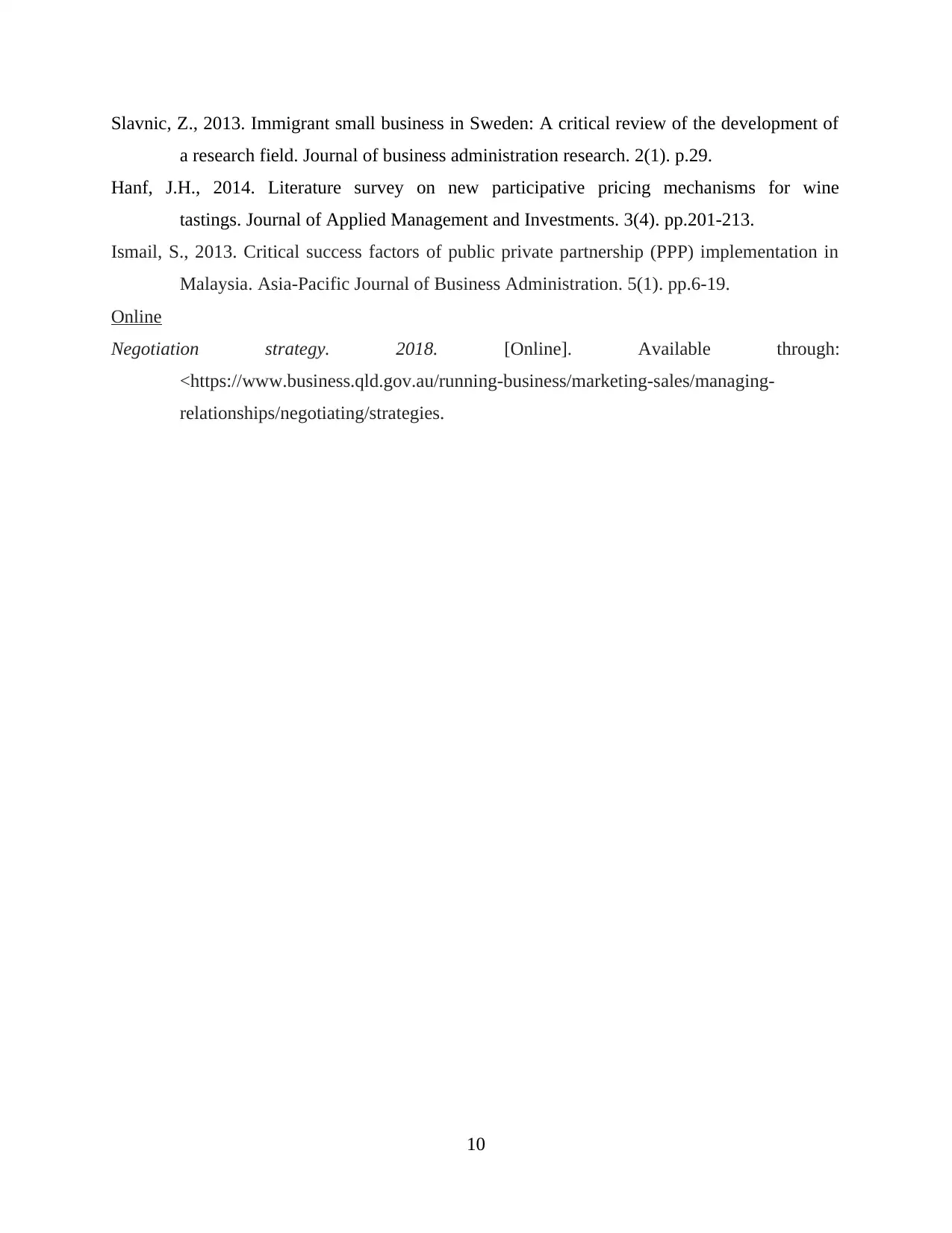
Slavnic, Z., 2013. Immigrant small business in Sweden: A critical review of the development of
a research field. Journal of business administration research. 2(1). p.29.
Hanf, J.H., 2014. Literature survey on new participative pricing mechanisms for wine
tastings. Journal of Applied Management and Investments. 3(4). pp.201-213.
Ismail, S., 2013. Critical success factors of public private partnership (PPP) implementation in
Malaysia. Asia-Pacific Journal of Business Administration. 5(1). pp.6-19.
Online
Negotiation strategy. 2018. [Online]. Available through:
<https://www.business.qld.gov.au/running-business/marketing-sales/managing-
relationships/negotiating/strategies.
10
a research field. Journal of business administration research. 2(1). p.29.
Hanf, J.H., 2014. Literature survey on new participative pricing mechanisms for wine
tastings. Journal of Applied Management and Investments. 3(4). pp.201-213.
Ismail, S., 2013. Critical success factors of public private partnership (PPP) implementation in
Malaysia. Asia-Pacific Journal of Business Administration. 5(1). pp.6-19.
Online
Negotiation strategy. 2018. [Online]. Available through:
<https://www.business.qld.gov.au/running-business/marketing-sales/managing-
relationships/negotiating/strategies.
10
⊘ This is a preview!⊘
Do you want full access?
Subscribe today to unlock all pages.

Trusted by 1+ million students worldwide
1 out of 13
Related Documents
Your All-in-One AI-Powered Toolkit for Academic Success.
+13062052269
info@desklib.com
Available 24*7 on WhatsApp / Email
![[object Object]](/_next/static/media/star-bottom.7253800d.svg)
Unlock your academic potential
Copyright © 2020–2026 A2Z Services. All Rights Reserved. Developed and managed by ZUCOL.





